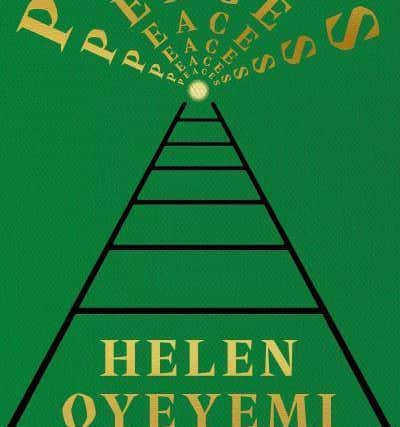Book review: Peaces, by Helen Oyeyemi


My dear Mum has a frequent complaint that I use long words and obscure phrases. Well, I stand guilty as charged and have no intention of changing my ways, and so will say boldly that Helen Oyeyemi’s new novel is about the oneiric and nominative determinism. The point about words is that they can be precise. I shall begin with “oneiric”, relating to or pertaining to dreams. It is not a word like “dream-like” or “dreamy”, with the connotations of a gauzy gavotte of fairies. It is more specific, and relates to the strange shifts, prophetic foreboding, buried memories and the psychological aspect of the dream. Nobody could begin this novel without a sense of unquiet lull. A couple, Xavier and Otto – who are on a honeymoon that is a not-honeymoon – embark on a train called The Lucky Day, which was a gift from an aunt. The train has different carriages, with symbols like a dagger, a bumblebee, a spinning wheel and a harp. Otto and Xavier are in the “Clock Carriage”. The train has a single permanent passenger, the enigmatic and do-no-disturb Ava Kapoor; where the train is going except around in circles is equally enigmatic.
Adding to the surrealism, Otto has a mongoose called Árpád. As they clickety-clack along they find other carriages, such as a library, a sauna, a kitchen, a gallery (with paintings that are blank, and everyone sees something different in them), and the private rooms of their host. She is there in order to prove her sanity. She too has a mongoose, Chela. She also has a strange relationship with a composer, Karel, and his son; and was paid to play the theremin piece he made to calm his son because of his bad nights. The theremin – used to spectacular effect in Messiaen’s Turangalila Symphony – is played without physical contact. The ghosts, it seems, are building up.
Advertisement
Hide AdThe book, like many of Oyeyemi’s, is a set of nested narratives. We learn about the previous histories Xavier and Otto have had on trains, and what the host’s assistants Allegra Yu and Laura de Souza have to reveal about what the heck is going on. As well as mongooses (mongeese?), there is a challenge match of Go, the initials X, Y and Z (both a Zeinab and a Zacharias). So this is not dreamy at all. It is craftily fashioned.


Now we turn to nominative determinism. Basically: your name defines you. So, “Stuart Kelly” would mean “servant of the man of war”. Oyeyemi is both florid and flagrant in her use of names. Otto and Xavier have taken his married name – Shin – which is Korean for real, true or belief. Árpád means seed, or light of redemption. Chela, the name of Ava’s mongoose, means “she who brings consolation”. Then there is the question about the book’s McGuffin. Everyone seems to have a connection to Karel’s son, Přemsyl Stojaspal. The name – I checked a lot of Czech dictionaries – comes out as “trickster” and “one who sleeps standing”. In his devious iterations, he might also be called “Svoboda”, which means freedom and Honza, a name substituted for Jan usually used for a ne’er-do-well but loveable character.
The novel does wink, surreptitiously, at influences. We get a nod to Agatha Christie’s 4.50 To Paddington, but Murder On The Orient Express is kept under the carpet. No mention, I might add, of The Sign In The Sky or The Mystery Of The Blue Train. The characters move around, somewhat like Go pieces (get the title now?), placed carefully and intentionally. The novel is dreamlike in that you never know quite what is happening, but un-dreamlike in that there is a technical intricacy behind it.
It is oneiric, rather than fantastical, or in the tradition of MR James’ ghost stories, or what some call speculative fiction. It is arch in its literariness, and nods at the reader with phrases like “Sunset sent up ribbons of gold that looped themselves around our clasped hands, and before too long, out entwined bodies”. The novel’s structure, such as it is, is to keep all the balls in the air and never to bow when all are caught. There is so much to admire here, but at the same time there is a kind of “I can do anything I want” aesthetic. Want to introduce a burning house, a prison scene, a bazaar, taxidermy, French toast? They’re all there. As is the sentence “He’s truthful. Not with words, mind. His abuse of linguistic function is almost demonic”. But the Devil doesn’t have the best tunes here.
Oyeyemi is a writer whose career has always fascinated me, but here it seems like a misdirection too far. Of course, a reader like me enjoys puzzle boxes. I even enjoy opening the box to find it was empty all along and my effort was simply vanity. But the characters here are so strangely cardboard that I did not feel the need to open the box.
There is a fleeting glimpse of one of literature’s most fleeting characters – Fantomâs, the elegant and inscrutable hero of the novels by Marcel Allain and Pierre Souvestre. Strangely, Oyeyemi seems to write like a flywheel that spins beautifully, but fails here to drive. Some parts of the book would make excellent short stories, but at the end, it seems as if the obvious manipulation has been by the author herself.
Peaces, by Helen Oyeyemi, Faber & Faber, £14.99
A message from the Editor:
Advertisement
Hide AdThank you for reading this article. We're more reliant on your support than ever as the shift in consumer habits brought about by coronavirus impacts our advertisers.
If you haven't already, please consider supporting our trusted, fact-checked journalism by taking out a digital subscription at https://www.scotsman.com/subscriptions